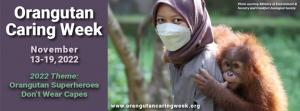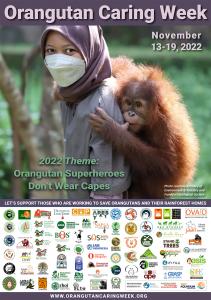2022 Orangutan Caring Week Celebrates Orangutans and the Heroes Who Help Save Them
This year's theme is "Orangutan Superheroes Don't Wear Capes"
The event will be celebrated November 13-19, 2022, with the theme “Orangutan Superheroes Don’t Wear Capes.” Fantasy superheroes seem to be all the rage these days as seen in an explosion in movies and interest over the last several years, but the 2022 Orangutan Caring Week theme this year focuses on all of the REAL LIFE, hardworking, orangutan superheroes who are dedicated to caring for, protecting and saving orangutans and their rainforest homes.
Orangutans, the only great ape naturally found in the forests of Southeast Asia, face an uncertain future. There are three species of orangutan: the Bornean Orangutan (Pongo pygmaeus), Sumatran Orangutan (Pongo abelii), and Tapanuli Orangutan (Pongo tapanuliensis). As a result of population decline, each species is classified as critically endangered (IUCN, 2022). There are currently hundreds of orphaned and displaced orangutans being cared for in rescue and rehabilitation centers across Borneo and Sumatra.
.
Orangutans are facing multiple human-caused threats – so it is up to us to enact solutions that will save them. Palm oil is the greatest threat to orangutans as forests converted to palm oil plantations have resulted in a great loss of habitat. More than half of all packaged products that Americans consume (soaps, detergents, snack foods, and more) contain palm oil. Other contributing threats to the crisis are the illegal pet trade, logging, conflict with humans, hunting, and climate change.
While orangutans are in critical danger, so is global biodiversity. Scientists estimate that between 150-200 species of plants, insects, birds, and mammals become extinct every day! So why care about orangutans? Saving orangutans helps save many other species that live in the same forest, like tigers, elephants, rhinos, gibbons, sun bears, and countless other less charismatic but ecologically important species of plants and animals.
Saving orangutans and safeguarding their futures would mean that we have finally made all the necessary adjustments to the over-consumptive practices that are ruining Earth's precious ecosystems and it would mean that we are taking seriously our personal impact on all life on our planet. As individuals, we need to make an impact on political and corporate entities to transform unsustainable policies and practices or there will be no future for orangutans as well as humankind.
Why care about orangutans? By saving orangutans, we save ourselves and our planet. If we can protect and save this closest of evolutionary cousins of ours and protect their rainforest homes, it would mean we are making the necessary changes to better protect all life on earth.
"It can be difficult sometimes for people to see the similarities between humans and orangutans," says Leif Cocks, Founder of The Orangutan Project. "I've spent the majority of my life with these great apes and witnessed their humanity many times. Orangutans have cognitive thoughts and have as much humanity as you or me, sometimes more so. They have some of the most beautiful souls you'll ever come across."
Orangutans could be the first great ape to go extinct. As one of our closest primate relatives, it is our responsibility to protect these intelligent, gentle apes. With each passing species, the Earth becomes a little less whole and more fragile.
Orangutans are intelligent, sentient beings that have lived in harmony with nature for millions of years, yet, due to human activity, their populations have declined by more than half over the past 60 years, and their habitat has been reduced by at least 55% over just the past 20 years.
We need nature for our very existence and only by saving nature do we save ourselves, yet we continue to destroy critical rainforest habitats and push hundreds of species ever closer to extinction. Rainforests and related ecosystems provide important ecological services from the air we breathe, to climate moderation, to water quality and erosion control, to existing as storehouses of genetic and ecological biodiversity.
Yet Orangutan Caring Week risks becoming just another forgettable special awareness week dedicated to yet another endangered species which shows up as fleeting posts or pictures that we scroll past on our Facebook and Twitter feeds. We are in crisis and issue overload. Saving orangutans may seem trivial in comparison to some of the issues people face. It is not.
We are also bombarded with hard-to-grasp estimates about how many orangutans are left in the wild, when they will go extinct, or how much forest habitat is cut down each minute of every day. We see heartbreaking photos of mutilated, tortured, or abused orangutans, and pictures of devastated rainforests and may feel powerless to do anything about it.
So, who cares and what can we do? Well, there are dozens of hardworking, dedicated orangutan superheroes, conservation groups, rescue and rehabilitation centers all working to save these incredible great apes.
Gary Shapiro, President of Orang Utan Republik Foundation expressed that, “Respecting the rights of orangutans to co-exist with humans is essential if we are to save them for the long term. While orangutans are unable to speak out to defend themselves, we all can be Orangutan Superheroes to give voice to orangutans as critically endangered species and as individual sentient beings."
We cannot all have boots on the ground, but we can fully support those who do whether financially or with our time and efforts. Many of these groups and individuals, along with zoos and animal facilities worldwide will be participating in Orangutan Caring Week with special social media campaigns, awareness about the plight of orangutans and the urgent dangers facing their rainforest homes with the goal of motivating people to care enough to be moved to action. If ever there was a time to care the time is now.
Holly Draluck
Orang Utan Republik Foundation, Inc.
+1 310-401-6602
email us here
Legal Disclaimer:
EIN Presswire provides this news content "as is" without warranty of any kind. We do not accept any responsibility or liability for the accuracy, content, images, videos, licenses, completeness, legality, or reliability of the information contained in this article. If you have any complaints or copyright issues related to this article, kindly contact the author above.


